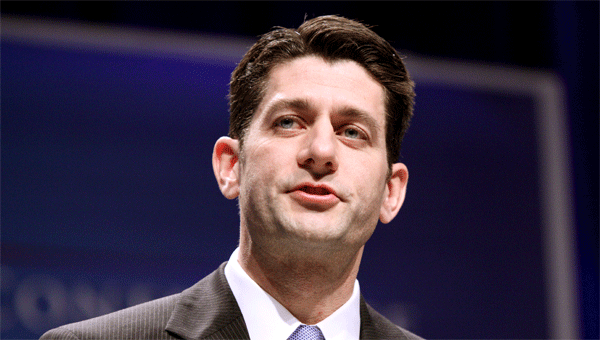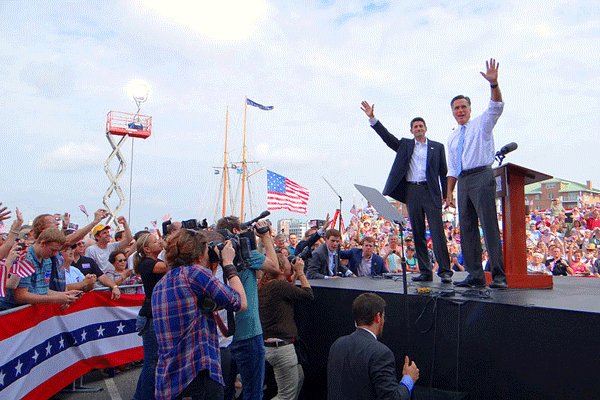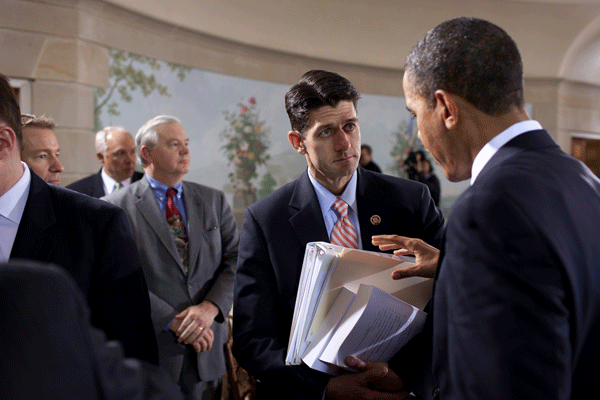Paul Ryan’s Environmental Record
Air Date: Week of August 24, 2012

(Photo: Wikimedia/Gage Skidmore)
Mitt Romney's energy plan promises more energy production through opening more areas to offshore oil and gas drilling, building the Keystone XL pipeline, and speeding up drilling permits. The environmental priorities of Congressman Paul Ryan, the GOP vice presidential pick, seem closely aligned with Romney's. Navin Nayak, the League of Conservation Voters head of campaigns, tells host Steve Curwood that Rep. Ryan has ties to the oil and gas industry and has voted against renewable energy subsidies during his reign in Congress.
Transcript
CURWOOD: From the Jennifer and Ted Stanley Studios in Boston, this is Living on Earth. I'm Steve Curwood.
As the national political season heads into high gear, Republican Mitt Romney has unveiled a comprehensive energy package to end dependence on foreign oil by 2020.
The Romney plan ramps up biofuel production, opens up Alaska's Arctic National Wildlife Refuge for oil drilling, approves the Keystone Pipeline, and gives states the right to regulate drilling on federal lands.
ROMNEY: On federal land, the permitting process to actually drill and get oil or gas is extraordinarily slow. Now interestingly, on state lands and private lands, state regulators have streamlined their permitting process; they've found a way because we compete, states do with one another, they found a way to do the job in a more efficient way. So for instance, in North Dakota is takes ten days to get a permit for a new well. In Colorado it takes 27 days. That's to get on state land a permit, or private land. But do you know how long it takes the federal government regulators to get your permit on federal land? On average three hundred and seven days. So here's what I'm going to do: I'm going to have the states take responsibility for the permitting process on federal lands.

(Photo: Wikimedia/James Currie)
[APPLAUSE]
CURWOOD: Governor Romney speaking on his energy plan. We now take a look at the environmental voting record of the GOP vice presidential hopeful, Wisconsin Congressman Paul Ryan. As he's served in Congress over the past decade, Mr. Ryan has gotten high marks among Republicans as a top leader for the cause of fiscal conservatism and budgetary management. Paul Ryan is also known as an avid outdoorsman and mountain biker. But when it comes to his voting record on the environment, the League of Conservation Voters has far less praise.
Joining us now is the senior vice president and head of Campaigns at the League of Conservation Voters, Navin Nayak. Welcome to Living on Earth.
NAYAK: Hey Steve
CURWOOD: So what kind of score did you give Congressman Ryan?
NAYAK: The Congressman has been in office for quite a while now and unfortunately his record consistently gets worse. He does have a lifetime score in the twenties on our national environmental scorecard but in 2011 he just scored a 3 per cent, meaning he only voted with the environment or for the pro environment position 3 per cent of the time
CURWOOD: Let's go over Congressman Ryan's record, he gets kudos from your organization for some votes that he's taken regarding the national forest, Tongass National Forest. What was that vote all about?
NAYAK: There's been a few votes historically - I think when Congressman Ryan came to Washington he really had a commitment to being a fiscal conservative and thought that there was a lot of wasteful government spending and there were issues related to the environment like subsidizing building of roads in national forests that he actually voted right on and agreed that we shouldn't use tax-payer dollars to build roads in our national forests just for logging or other purposes. So historically we've gotten him on those kinds of votes but those, unfortunately have been few and far between.
CURWOOD: What's his position been on renewable energy?
NAYAK: You know unfortunately this has been one place where Congressman Ryan has been unfortunately consistent. He is not a supporter of renewable energy. And I think that it speaks to the contradiction in a lot of words he's been pushing in the campaign. He's very fond of talking about not wanting to pick winners and losers. But he has consistently opposed investing in clean energy, whether it's production tax credit... investment in clean energy. And at the same time he's been a pretty big proponent of providing billions of dollars in tax breaks to oil companies. So basically every time he's had a vote on clean energy he's voted the wrong way and he's voted to oppose the industry.
CURWOOD: Now you say from your perspective he's voted the wrong way, but he's a fiscal conservative. He voted against the US spending $50 million to put more roads into the Tongass to get $500,000 in fees back, protecting the tax-payer. He is saying, look renewable energy is expensive. We shouldn't have to have federal subsidies to do this. Let the market do this.
NAYAK: It is one thing if you are consistent and you just generally oppose federal subsidies period. But for him to propose a budget, which is a part of the Ryan plan, that provides $40 billion in tax breaks to oil companies--the richest companies in the world, and I think that all tax-payers and all voters across the country can agree that that is the one industry that doesn't need federal support anymore. Yet he's more than happy to give them tax breaks while at the same time suggesting that we shouldn't invest in clean energy because it's a waste of tax-payer dollars.

President Barack Obama talks with Rep. Paul Ryan, R-Wisc., during a bipartisan meeting on health insurance. (Official White House Photo by Pete Souza)
CURWOOD: Now Congressman Paul Ryan has released his financial records and the Washington Post found that his family is invested in some companies that lease rights to oil, gas, mineral and timber resources. How much of this is a conflict of interest in your view.
NAYAK: We think it's a major conflict of interest. In fact the League of Conservation Voters ran an ad in Paul Ryan's congressional district last year, hitting him on this very issue, when the report first came out, which is that not only is Paul Ryan's family invested in owning land that they're leasing out to oil and gas companies but those companies are benefitting from the very tax breaks that Paul Ryan is pushing.
CURWOOD: If Congressman Ryan were here he's say, "but wait a second this is only 20-30 thousand dollars a year," out of - what - a third of a million dollars that his family takes in each year, or did last year. It's not very big money these interests.
NAYAK: I think for the average American 20 thousand dollars is a real amount of income. And unfortunately a pretty substantial percentage of what many Americans are making in any given year. And so, I think at the heart of it it speaks to what many Americans are frustrated with Washington, politicians--is that they're much more interested in looking out for themselves, in looking out for the campaign contributors. And Paul Ryan really should've avoided doing things that benefit his business associates.
CURWOOD: Out of all the possible vice presidential candidates that were discussed or out in the press, how does Ryan compare with them on the question of the environment?
NAYAK: I mean I think at the end of the day he is certainly one of the more extreme anti-environmental members that were on Governor Romney's short list. I think you have someone like Tim Pawlenty who used to believe in global warming, has actually been a part of passing clean energy standards when he was governor of Minnesota. So he jumps out as someone who has a much better record on some of these issues. Unfortunately he has distanced himself from some of those, but compared to Paul Ryan who has consistently been part of clean energy, taken nearly a quarter of a million dollars from oil and gas companies. He really would've been one of the world choices that governor Romney could've made and I think that speaks a lot to the governors priorities.
CURWOOD: Navin Nayak is senior vice president and head of campaigns at the League of Conservation Voters. Thank you so much sir.
NAYAK: My pleasure.
Links
Ryan’s 2009 Op-Ed in the Journal Times: “Misplaced Priorities”
Ryan’s Official Environmental Policy Page
The League of Conservation Voters scored Ryan at 3% on his environmental record
Listen to Mitt Romney’s speech on his energy plan from Hobbs, New Mexico August 23, 2012
Living on Earth wants to hear from you!
Living on Earth
62 Calef Highway, Suite 212
Lee, NH 03861
Telephone: 617-287-4121
E-mail: comments@loe.org
Newsletter [Click here]
Donate to Living on Earth!
Living on Earth is an independent media program and relies entirely on contributions from listeners and institutions supporting public service. Please donate now to preserve an independent environmental voice.
NewsletterLiving on Earth offers a weekly delivery of the show's rundown to your mailbox. Sign up for our newsletter today!
 Sailors For The Sea: Be the change you want to sea.
Sailors For The Sea: Be the change you want to sea.
 The Grantham Foundation for the Protection of the Environment: Committed to protecting and improving the health of the global environment.
The Grantham Foundation for the Protection of the Environment: Committed to protecting and improving the health of the global environment.
 Contribute to Living on Earth and receive, as our gift to you, an archival print of one of Mark Seth Lender's extraordinary wildlife photographs. Follow the link to see Mark's current collection of photographs.
Contribute to Living on Earth and receive, as our gift to you, an archival print of one of Mark Seth Lender's extraordinary wildlife photographs. Follow the link to see Mark's current collection of photographs.
 Buy a signed copy of Mark Seth Lender's book Smeagull the Seagull & support Living on Earth
Buy a signed copy of Mark Seth Lender's book Smeagull the Seagull & support Living on Earth

